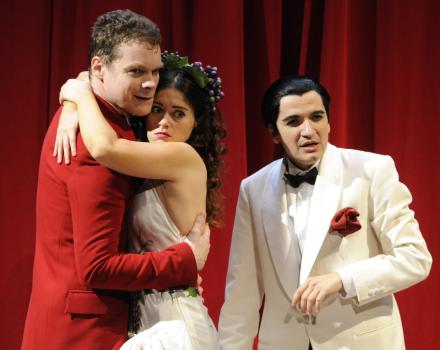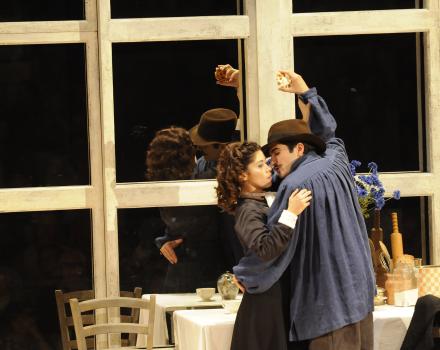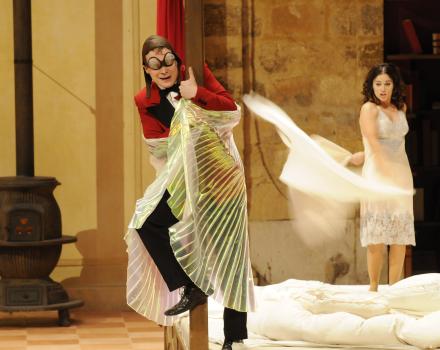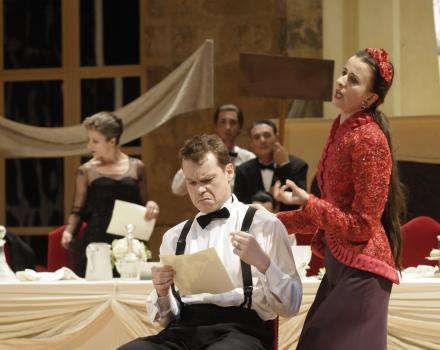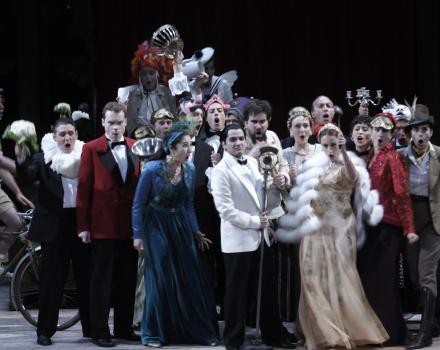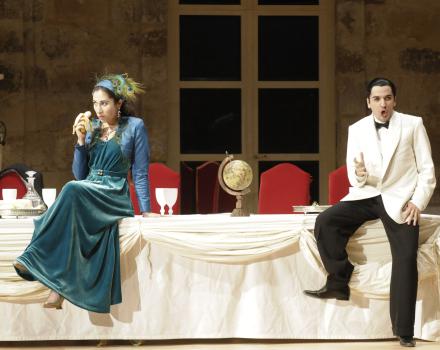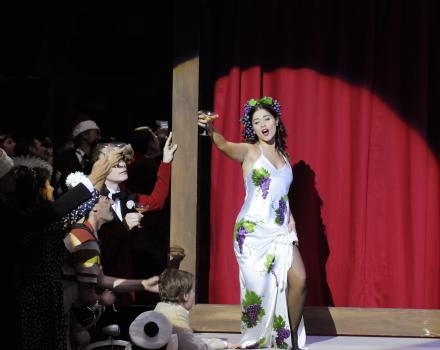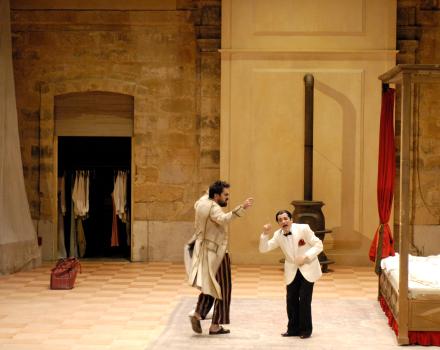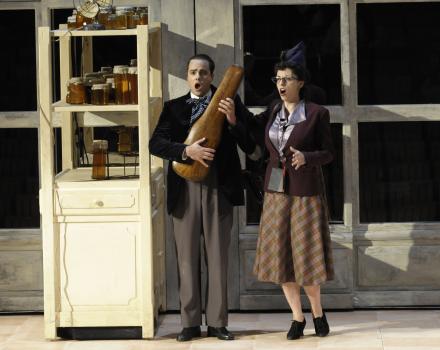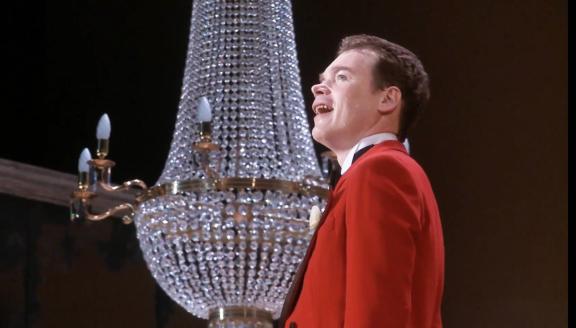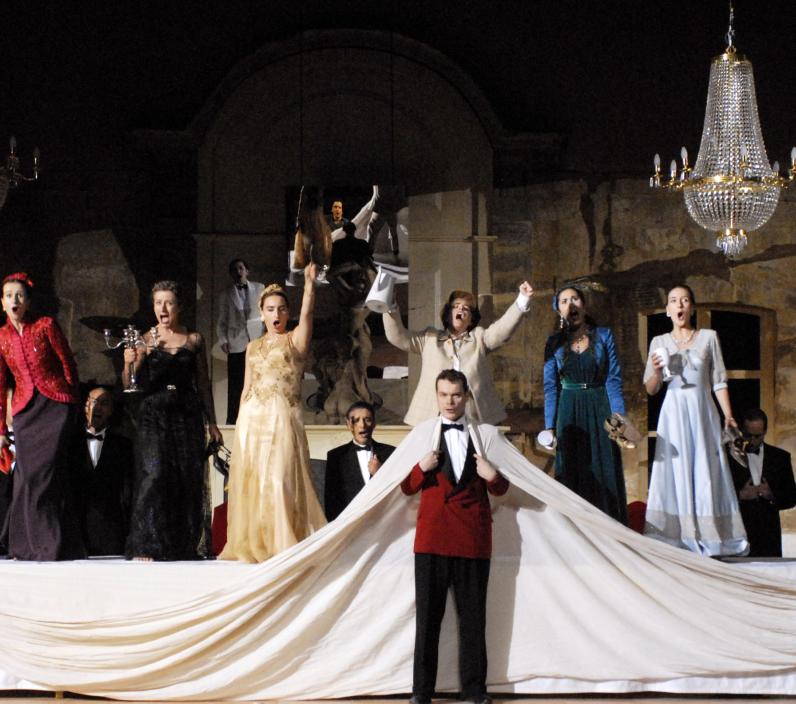
Orphée aux Enfers

Here is an irreverent take on the tragic story of the lovers Orpheus and Eurydice. With his librettists Hector Crémieux and Ludovic Halévy, Jacques Offenbach creates a wonderful array of characters from the heavens who find themselves caught up in domestic antics.
Eurydice, the central figure, hates the music personified by her spouse, Orpheus, a humble music teacher from Thebes. Aristaeus, a shepherd and divine seducer, is actually Pluto himself disguised. Jupiter, father of the gods, is constantly on the prowl for the ladies. Yes the goddesses and gods are weary of everyday life on Olympus and are in search of diversions. Burning with curiosity about the beautiful abductee and the contest between Jupiter and Pluto for the favour of Eurydice, the illustrious company embarks on a hellish ride into the underworld, culminating in what is probably the most famous can-can in music history. In this enchanting production from the Festival d’Aix-en-Provence from 2009 with a young cast from the European Academy of Music, director Yves Beaunesne transposes the action to the 1940s and spreads it over the four floors of a bourgeois residence. From the kitchen (Orpheus' home) to the attic (the Underworld), via the dining room (Olympus) and the bedroom (Pluto's boudoir), he succeeds in teasing out all the humour and elegance of Offenbach’s satirical masterpiece.
Cast
|
Eurydice
|
Pauline Courtin
|
|---|---|
|
Orphée
|
Julien Behr
|
|
Aristée / Pluton
|
Mathias Vidal
|
|
Jupiter
|
Vincent Deliau
|
|
L’Opinion Publique
|
Marie Gautrot
|
|
John Styx
|
Jérôme Billy
|
|
Mercure
|
Paul Cremazy
|
|
Cupidon
|
Emmanuelle De Negri
|
|
Diane
|
Soula Parassidis
|
|
Vénus
|
Marie Kalinine
|
|
Minerve
|
Estelle Kaique
|
|
Junon
|
Sabine Revault d'Allonnes
|
|
Chorus
|
Chorus of Festival d’Aix-en-Provence
|
|
Orchestra
|
Camerata Salzburg
|
| ... | |
|
Music
|
Jacques Offenbach
|
|---|---|
|
Text
|
Hector Crémieux
Ludovic Halévy
|
|
Conductor
|
Alain Altinoglu
|
|
Director
|
Yves Beaunesne
|
|
Dramaturgy, adaptation
|
Marion Bernède
|
|
Chorus master
|
Nicolas Kruger
|
|
Choreography
|
Jean Gaudin
|
|
Sets
|
Damien Caille-Perret
|
|
Lighting
|
Joël Hourbeigt
|
|
Costumes
|
Patrice Cauchetier
|
|
Hair and make-up
|
Catherine Saint-Sever
|
| ... | |
Videos
THE STORY
Act I
First tableau
Orpheus, a violin teacher, and Aristaeus, a beekeeper, live in the vicinity of Thebes. Public Opinion watches over the morality of her fellow citizens. Eurydice pooh-poohs her marital home, on the prowl around the house of a handsome neighbour. Returning from a day of classes, Orpheus does not hide his irritation and the couple quarrel heatedly. Their marriage seems on the rocks. Eurydice is weak at the knees for Aristaeus and it seems that Orpheus has set a trap in the field for her. In truth, it is Aristaeus who is trying to trap Eurydice. She succumbs with little resistance, to the great joy of the beekeeper, who is none other than Pluto, determined to take his beloved Eurydice to the infernal empire. Back for dinner, Orpheus learns that his wife has died. He has no time to rejoice when Public Opinion calls on him: he will lose all his income if he does not set out to claim back Eurydice.
Second tableau
On Olympus, the gods are asleep, except for Cupid and Venus, who have gone out on the town, and Diana, who has returned from her bath vexed for not having found her Actaeon. Jupiter rails against the licentiousness of divine morals, but Juno is quick to reproach him for his repeated infidelities. However, he had nothing to do with the Eurydice affair. Following a tip-off from Mercury, Jupiter summons Pluto. Pluto pretends to bemoan his fate but is interrupted by a demonstration of the gods, fed up with their life on Olympus and Jupiter's hypocrisy. So when Public Opinion and Orpheus come to claim Eurydice, all of Olympus decides to descend to the Underworld; Jupiter out of curiosity about the pretty woman, the other gods in search of a little fun.
Act II
Third tableau
Locked up in Pluto's boudoir, Eurydice is already bored, especially as her jailer John Styx, who tends to drink too much of Lethe's water, bothers her with his amorous sighs and life story. Styx has just enough time to hide her before Pluto arrives escorted by the suspicious Jupiter, who searches for the young woman and finally locates her behind a closed door. Cupid transforms Jupiter into a fly, which flies through the keyhole to seduce the little flirt Eurydice. The latter, delighted by the encounter, then escapes.
Fourth tableau
At the bacchanal that the Underworld offers to its guests from Olympus, Eurydice, disguised as a bacchante, sings the glory of Bacchus, then Jupiter orders a royal minuet, and everything ends in a demonic gallop. The new lovers are about to flee when the jealous Pluto stops them and reminds Jupiter of his duties. Forward steps Orpheus, led by Public Opinion. The meeting is solemn. To protect his reputation, Jupiter pretends to grant Orpheus' request, but sets an 'express and inexplicable' condition: that he does not look back at his wife when he leaves. To force him to make the fatal move, the god release a thunderbolt. Orpheus turns around automatically. To confirm Eurydice's release, Jupiter transforms her into a bacchante.
Insights
Four questions to Yves Beaunesne, director
What is your take on Offenbach’s two versions of the opera and its dialogues?
Orpheus in the Underworld is Offenbach's most caustic work from 1858, an incisiveness he revisited in 1874. Offenbach's devastating humour triggers two laughs: a light laugh at the political and social subject matter, and a greater laugh at his treatment of mythology. To get back to the original radicality, these proportions must be reversed: mythology no longer speaks to us so directly, although it was a pillar of the classical humanities that formed the bourgeoisie. To simply restore the opera would be to betray its spirit. I felt it was essential to transpose it to find a new relationship with time and society that is faithful to what Offenbach and his librettists gave us. Indeed, this was Offenbach’s very approach, as never hesitated to rewrite parts to ensure the effectiveness of a show. Of course, we have not touched the sung lyrics: only the spoken dialogues are partially rewritten to emphasise the social criticism, which is at the heart of the work and which gives it its relevance today.
Is the break up of the mythical couple irremediable from the start?
In Orpheus in the Underworld, I hold on to 'Underworld'. The caustic spirit of the work made us think of the Parisian cabarets of the 1930s, its vitriolic depiction of a world spinning out of control, hurtling towards pleasure and loss, where everyone is trying to save their own skin. In this world, Eurydice occupies a central position: belonging to no one, she becomes everyone's plaything, she is chosen rather than doing any choosing herself. We see her as a little Parisian maid, such as could be found in bourgeois neighbourhoods, but also in literature and the male imagination. She is tempted by upward social mobility and will lose her feathers on the way up, perhaps even be completely crushed. The characters in the piece are black and grey, only she retains some colour through her freedom and inner joy, which touches us. With her virtuoso score, her musical volubility that escapes the Cartesian logic of men; she reminds me of the caged canary that the miners used to take down with them into the galleries, and whose last warble signalled the imminence of danger.
In what environment did you see this Orpheus in the Underworld?
Even though Offenbach conceived his work in a period of political regression and economic explosion close to our own, we have had set it in a time and space that would make it more striking. The years preceding the Second World War, the French capital and its opulent mansions seemed to us to be in keeping with the spirit of the opera. The verticality of the set, which unfolds over the four floors of a bourgeois mansion, with its metaphorical logic of stairs, suggests not a descent but an ascent into the underworld. The general movement is that of a mad rush, of increasingly unbridled licence, of ever stronger and more brutal pleasures. In Paris, for the bourgeoisie, the upward movement can be synonymous with danger: one goes up to Belleville, to the Buttes Chaumont, to the Butte Montmartre, to the Moulin-Rouge, to the pleasure districts or the popular enclaves where revolts are whipped up. The Marseillaise, which resounds in the chorus of the revolt of the gods, was only to become the national anthem again in 1879. The threat to Eurydice, a victim of this society, is a vulgar end that the final cancan suggests. She plays a tragic hand with the cards of comedy.
What place is left for myth in this vision of the opera?
It is the myth that guarantees freedom, metaphorical diversions and openness to dreaming. The inherently malleable nature of myth thus authorises the intrusion of the Public Opinion, so important in Orpheus's departure for the Underworld, and which a year earlier had provoked the trials of Madame Bovary and Les Fleurs du mal... The dream, which is born of the music and its distortions with the text, gives the characters a chance. Something in the music continues to tell of the courage of Eurydice, for whom Offenbach feels great tenderness and who he slips into our hearts. Through this character, the score exudes a humanity and benevolence in which Nietzsche saw the supreme form of Offenbach's spirituality: ‘a model of Voltairian music, an ideal of frivolity’. With Offenbach, laughter has the superior ability to outwit short-sighted reality for the sake of a brighter tomorrow.
Interview by Agnès Terrier, extract from the 2009 Aix-en-Provence Festival programme
Gallery
